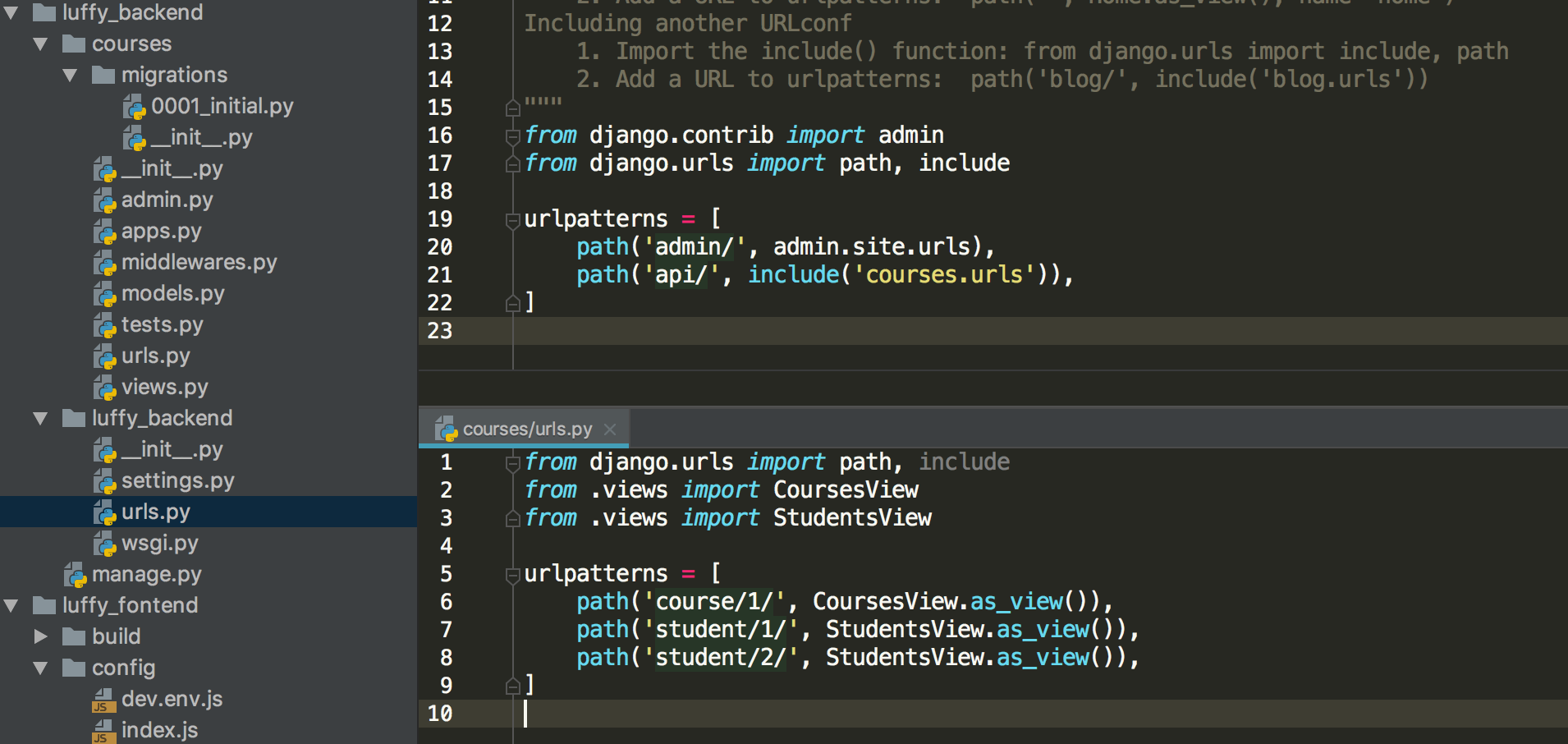什么是Axios
Axios是基于Promise的Http客户端,可以在浏览器和node.js中使用。
为什么使用Axios
Axios非常适合前后端数据交互,另一种请求后端数据的方式是vue-resource,vue-resource已经不再更新了,且只支持浏览器端使用,而Axios同时支持浏览器和Node端使用。
Vue开发者推荐使用更好的第三方工具,这就是Axios,详细的文件,请参考Evan You的这篇文章。
安装
Axios的安装支持多种方式
npm安装
1 |
npm install axios |
cdn
1 |
<script src="https://cdn.bootcss.com/axios/0.18.0/axios.min.js"></script> |
使用方式介绍
接下来,我们使用Django,搭建一个后台程序,并使用Vue Cli搭建一个前端程序,使用Axios进行前后端数据交互。
使用Vue Cli创建一个前端程序
1 |
vue init webpack luffy_fontend |

使用Django创建一个后端程序luffy_backend
1 |
django-admin startproject luffy_backend |
创建一个courses应用
12 |
cd luffy_backendpython manage.py startapp courses |
在models.py中创建两个类
123456789101112131415161718192021 |
from django.db import models# Create your models here.class Courses(models.Model): course_name = models.CharField(max_length=32) course_price = models.IntegerField() course_teacher = models.CharField(max_length=16) start_date = models.DateField(auto_now=True, null=False) end_date = models.DateField(auto_now=True, null=False) def __str__(self): return self.course_nameclass Students(models.Model): student_name = models.CharField(max_length=16) student_id = models.IntegerField() student_phone = models.IntegerField() student_address = models.CharField(max_length=128) |
插入数据
123456789101112131415 |
// courses_coursesinsert into courses_courses(course_name, course_price, course_teacher, start_date, end_date) values('Python全栈中级开发', 12800, 'Pizza', '2018-10-01', '2018-10-02');insert into courses_courses(course_name, course_price, course_teacher, start_date, end_date) values('Python全栈高级开发', 19800, 'Alex', '2018-10-03', '2018-10-04');insert into courses_courses(course_name, course_price, course_teacher, start_date, end_date) values('Linux高级运维', 12800, 'Oldboy', '2018-10-05', '2018-10-06');insert into courses_courses(course_name, course_price, course_teacher, start_date, end_date) values('高级网络工程师', 12800, 'Egon', '2018-10-07', '2018-10-08');insert into courses_courses(course_name, course_price, course_teacher, start_date, end_date) values('Go全栈高级开发', 12800, 'Yuan', '2018-10-09', '2018-10-10');insert into courses_courses(course_name, course_price, course_teacher, start_date, end_date) values('Vue高级开发', 12800, 'Xiaoma', '2018-10-11', '2018-10-12');// courses_studentsinsert into courses_students(id, student_name, student_id, student_phone, student_address) values(1, 'Alex', 100001, 1378061875, '北京市大兴区智障一中');insert into courses_students(id, student_name, student_id, student_phone, student_address) values(2, 'Pizza', 100002, 1378161875, '北京市朝阳区第一中学');insert into courses_students(id, student_name, student_id, student_phone, student_address) values(2, 'Egon', 100003, 1378261875, '北京市房山智障三中');insert into courses_students(id, student_name, student_id, student_phone, student_address) values(4, 'Oldboy', 100004, 1378361875, '北京市大兴区智障三中');insert into courses_students(id, student_name, student_id, student_phone, student_address) values(5, 'Yuanhao', 100005, 1378460275, '北京市丰台区智障四中');insert into courses_students(id, student_name, student_id, student_phone, student_address) values(6, 'Jinxin', 100006, 1378560875, '北京市海淀区智障五中');
|
在views.py中写好接口
1234567891011121314151617181920212223242526272829303132333435363738394041424344454647484950515253545556 |
from django.shortcuts import render, HttpResponsefrom rest_framework.views import APIViewimport jsonfrom luffy_backend import settingsfrom .models import Coursesfrom .models import Students# Create your views here.class CoursesView(APIView): def get(self, request): print("Courses Get Methods Exec!") courses = list() for item in Courses.objects.all(): course = { "course_name": item.course_name, "course_price": item.course_price, 'course_teacher': item.course_teacher, 'start_date': str(item.start_date), 'end_date': str(item.end_date) } courses.append(course) print(courses) return HttpResponse(json.dumps(courses, ensure_ascii=False))class StudentsView(APIView): def get(self, request): print("Student Get Methods Exec!") students = list() for item in Students.objects.all(): student = { 'student_name': item.student_name, 'student_id': item.student_id, 'student_phone': item.student_phone, 'student_address': item.student_address } students.append(student) return HttpResponse(json.dumps(students, ensure_ascii=False)) def post(self, request): print("Student Post Methods Exec!") print(request.body.decode('utf-8')) response = json.dumps(request.POST) return HttpResponse(response)
|
定义接口

配置后台接口
注意,修改配置文件后,需要重启前端服务器。

在Vue Cli中使用axios
123456789101112131415161718192021 |
// The Vue build version to load with the `import` command// (runtime-only or standalone) has been set in webpack.base.conf with an alias.import Vue from 'vue'import App from './App'import router from './router'import store from './store'import axios from "axios"Vue.prototype.$axios = axios;Vue.config.productionTip = false;new Vue({ el: '#app', router, template: '<App></App>', components: { App }, store: store});
|
获取课程信息
12345678910111213141516171819202122232425262728293031323334353637383940414243444546474849505152535455565758 |
<template> <div> <span>这是课程详情页面</span> <button @click="getCourses">点击获取全部课程</button> <div v-if="isShow"> <table border="1"> <thead> <tr> <th>课程名称</th> <th>课程价格</th> <th>授课老师</th> <th>开课日期</th> <th>结课日期</th> </tr> </thead> <tbody> <tr v-for="(course, index) in courses" :key="index"> <td>{{ course.course_name }}</td> <td>{{ course.course_price }}</td> <td>{{ course.course_teacher }}</td> <td>{{ course.start_date }}</td> <td>{{ course.end_date }}</td> </tr> </tbody> </table> </div> </div></template><script> export default { name: "Courses", data() { return { isShow: false, courses: [] } }, methods: { getCourses: function () { let ts = this; this.$axios.get('/api/course/1/') .then(function (response) { ts.isShow = true; ts.courses = response.data; }) .catch(function (error) { console.log(error); }); } } }</script><style scoped></style>
|
获取学生信息
123456789101112131415161718192021222324252627282930313233343536373839404142434445464748495051525354555657585960616263646566676869707172 |
<template> <div> <span>这是学员信息页面</span> <button @click="getStudents">点击获取学生信息</button> <button @click="changeStudents">点击修改学生信息</button> <div v-if="isShow"> <table border="1"> <thead> <tr> <th>学生ID</th> <th>学生姓名</th> <th>学生电话</th> <th>学生地址</th> </tr> </thead> <tbody> <tr v-for="(student, index) in students" :key="index"> <td>{{ student.student_id }}</td> <td><input v-model="student.student_name"/></td> <td><input v-model="student.student_phone"/></td> <td><input v-model="student.student_address"/></td> </tr> </tbody> </table> </div> </div></template><script> export default { name: "Students", data() { return { isShow: false, students: [] } }, methods: { getStudents: function () { let ts = this; this.$axios.get('/api/student/1/') .then(function (response) { console.log(response); ts.isShow = true; ts.students = response.data; }) .catch(function (error) { console.log(error); }) }, changeStudents: function () { let ts = this; this.$axios.post('/api/student/2/', { student_name: 1, student_id: 100001, student_phone: 1347658765, student_address: "北京市石景山区智障六中" }) .then(function (response) { }) .catch(function (error) { console.log(error); }) } } }</script><style scoped></style>
|
处理跨域问题
发送post请求时,需要解决跨域问题,我们采用在Django中自定义一个处理跨域问题的中间件来解决这个问题。
12345678910 |
from django.utils.deprecation import MiddlewareMixinclass MyCore(MiddlewareMixin): def process_response(self, request, response): response["Access-Control-Allow-Origin"] = '*' if request.method == 'OPTIONS': response["Access-Control-Allow-Headers"] = 'Content-Type' response["Access-Control-Allow-Methods"] = 'POST, DELETE, PUT' return response |
以上,就是我们通过Axios的get和post请求与后台进行数据交互的全过程。
来源:https://www.cnblogs.com/lingcai/p/10320416.html